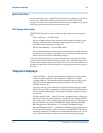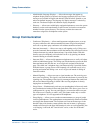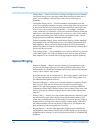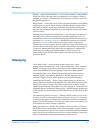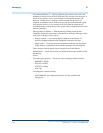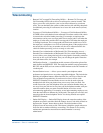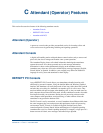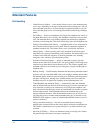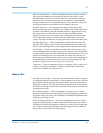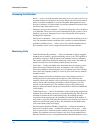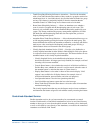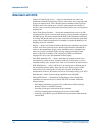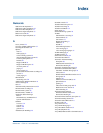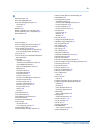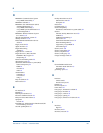
Attendant Features C
Overview for Avaya IP600 Internet Protocol Communications Server
555-233-001 — Issue 5 — November 2000
128
Attendant Features
Call Handling
• Listed Directory Number — llows outside callers to access your attendant group
in two ways, depending on the type of trunk used for the incoming call. You can
allow attendant group access via incoming direct inward dial trunks, or you can
allow attendant group access via incoming Central Office) and foreign exchange
trunks.
• Call Waiting — Allows an Attendant to let a single-line telephone user who is on
the phone know that a call is waiting. The Attendant is then free to answer other
calls. The Attendant hears a call waiting ringback tone and the busy telephone
user hears a call waiting tone. This tone is heard only by the called telephone user.
• Calling of Inward Restricted Stations — A telephone with a Class of Restriction
that is inward restricted cannot receive public network, attendant-originated, or
attendant-extended calls. This feature allows you to override this restriction.
• Priority Queue — Places incoming calls to the Attendant in an orderly queue
when these calls cannot go immediately to the Attendant. This feature allows you
to define twelve different categories of incoming attendant calls, including
emergency calls, which are given the highest priority.
• Override of Diversion Features — Allows an Attendant to bypass diversion
features such as Send All Calls and Call Coverage by putting a call through to an
extension even when these diversion features are on. This feature, together with
Attendant Intrusion, can be used to get an emergency or urgent call through to a
telephone user.
• Backup Alerting — Notifies backup Attendants that the primary Attendant cannot
pick up a call. It provides both audible and visual alerting to backup stations when
the attendant queue reaches its queue warning level. When the queue drops below
the queue warning level, alerting stops. Audible alerting also occurs when the
attendant console is in night mode, regardless of the Attendant queue size.
• Timed Reminder and Attendant Timers — Automatically alerts the Attendant
after an administered time interval for the following types of calls: extended calls
to be answered or waiting to be connected to a busy single-line telephone, one-
party calls placed on hold on the console, and transferred calls that have not been
answered after transfer. Timed Reminder informs the Attendant that a call
requires additional attention. After the Attendant reconnects to the call, the user
can either choose to try another extension number, hang up, or continue to wait.
DEFINITY ECS supports a variety of administrable attendant timers for use in a
variety of situations.
• Privacy (Attendant Lockout) — Prevents an Attendant from re-entering a
multiple-party connection held on the console unless recalled by a telephone user.
This feature is administered on a system-wide basis. It is either activated or not
activated.
• Intrusion (Call Offer) — Allows an Attendant to enter an existing call to inform
the person being called about a message or another call.



